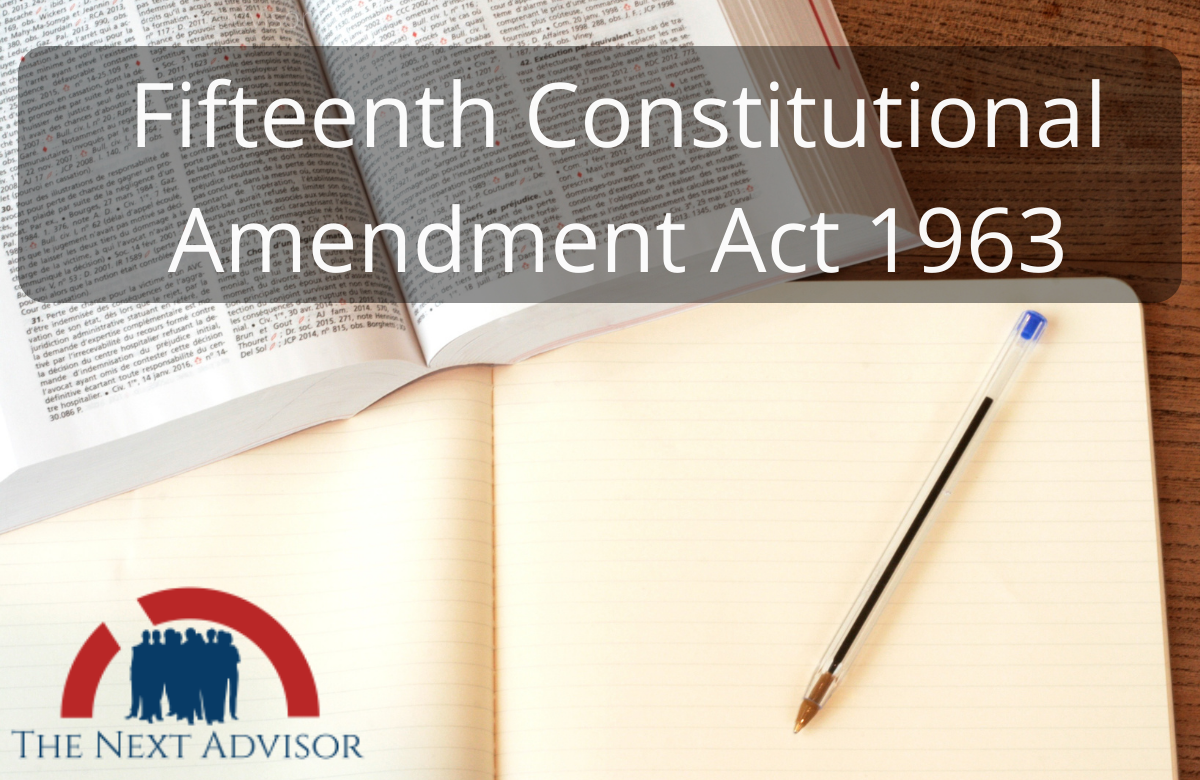Constitutional Amendment is a very important and interesting topic for studies and knowledge also. So let us see the 15th constitutional amendment in detail. Our Constitution is rigid and flexible in nature. Therefore it changes according to the need of society without changing its basic structure.
History for 15th Constitutional Amendment
On 16th August 1962 India and France exchanged the instruments of ratification under which France ceded to India full sovereignty over the territories it held.
Pondicherry and the other enclaves of Karaikal, Mahe, and Yaham came to be administered as the Union Territory of Puducherry from 1 July 1963.
Statement Of Objects And Reasons of 15th Constitutional Amendment
-
With the ratification of the Treaty of Cession by the Governments of India and France, on 16th August 1962, the French establishments of Pondicherry, Katika Mahe, and Yanam became territories of the Indian Union with effect from that date.
-
This Bill provides for these territories being specified in the Constitution itself as a Union territory called ‘Pondicherry’.
-
Under Article 81(1) (b) of the Constitution, not more than twenty members are to represent the Union territories in the House of the People.
-
This maximum has already been reached. The Bill accordingly seeks to increase this number to twenty-five to enable representation being given immediately to Pondicherry in the House of the people and to provide for future contingencies.
-
The Bill also provides for representation of the territory in the Council of States.
-
It is proposed to create Legislatures and Councils of Ministers in the Union territories of Himachal Pradesh, Manipur, Tripura, Goa, Daman, Diu, and Pondicherry broadly on the pattern of the scheme which was in force in some of the Part C States before the reorganization of the States.
-
The Bill seeks to confer necessary legislative power on Parliament to enact laws for this purpose through a new article 239A which follows generally the provisions of article 240 as it stood before the reorganization of the States.
Insertion of New Article 239A- through this Constitutional Amendment
“Article 239. Creation of local Legislatures or Council of Ministers or both for certain Union territories. –
(1)Parliament may by law create for the Union Territory of Puducherry –
a body, whether elected or partly nominated and partly elected, to function as a Legislature for the Union territory, or a Council of Ministers, Or both with such constitution, powers, and functions, in each case, as may be specified in the law.
(2)Any such law as is referred to in the above clause shall not be deemed to be an amendment of this Constitution for the purposes of article 368 notwithstanding that it contains any provision which amends or has the effect of amending this Constitution.
Statement Of Objects And Reasons
It is related to Articles 124, 128, 217, 220, 222, 224A, 226, and entry 78 of the Union List.
It is proposed to amend article 217 so as to raise the age of retirement of the High Court Judges from sixty years to sixty-two years. When any question arises to the correct age of a Judge of the Supreme Court or of a High Court, the question has to be decided by the President.
It is proposed to make the position clear by making a specific provision in Articles 124 and 217. It is considered desirable in the public interest that Judges should be transferred from one High Court to another. Such transfer is expected to impose an additional financial burden on the Judge who is so transferred.
It is, therefore, proposed to pay him some compensatory allowance in addition to his salary. When a Judge is transferred from one High Court to another, he cannot, in view of the provisions of Article 220, resume practice in any of the High Courts in which he has held office as s Judge.
The provisions of Article 220, therefore, put a check on the proposal for the transfer of any Judge of a High Court. It is, therefore, proposed to amend Article 220 so that the restriction regarding resumption of practice should apply only to the High Court from which the Judge retires. Provided that he had served in that High Court for a period of at least five years immediately before retirement.
Such a provision would facilitate the transfer of Judges.
Under the existing Article 226 of the Constitution, the only High Court which has jurisdiction with respect to the central government is the Punjab High Court. This involves considerable hardship to litigants from distant places. It is, therefore, proposed to amend Article 226 so that when any relief is sought against any Government, authority, or person for any action taken,
The High Court within whose jurisdiction the cause of action arises may also have jurisdiction to issue appropriate directions, orders, or writs.

























